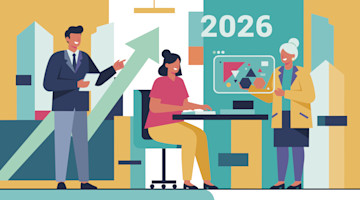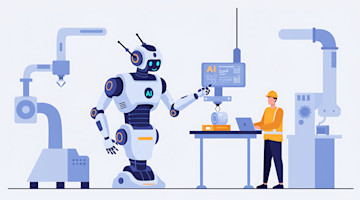TECHNOLOGY
How Do I Train for Future Technology?
That’s the fun part – you don’t. The culture of technology adoption has rapidly changed over the last few generations. With the influx of more advanced technologies at the consumer level, modern workforces are learning on the fly based on specific needs and use cases. Some of the accelerators for modern manufacturing technologies that support this are the simplified human-to-machine interfaces and multiple programming techniques for automation. For a long time, manufacturers have strived for stability. In today’s climate, fluidity will give you a competitive edge. Want to enable a continuously learning workforce? Challenge the workforce with your business problems and provide them with time. Let this generation cook.
INTELLIGENCE
An Evolving Manufacturing Workforce
Since 1972, U.S. manufacturing output has nearly tripled, even as employment has declined by 25%, indicating a fourfold increase in output per worker. Notably, production employee numbers have decreased by 32%, while non-production and supervisory roles have only seen a 7% reduction. This trend suggests that knowledge work in manufacturing has demonstrated resilience over the past five decades.
Looking ahead, manufacturing employment will likely continue to shift and grow toward knowledge-based roles. As advanced manufacturing is adopted and evolves, demand will increase for workers skilled in leveraging data and information to optimize manufacturing processes. This transformation reflects the growing importance of the skills needed to harness and utilize information within the manufacturing sector, reshaping the industry's workforce requirements for the future.
SMARTFORCE
Bigger, Bolder, and More Connected: The 2025 AMT Meetup Series
The AMT Meetup series is back – bigger, bolder, and more connected than ever! In 2025, we’re teaming up with Women in Manufacturing (WiM) to bring even more industry leaders, technology end users, and decision-makers together at high-impact networking happy hours. Join us in Charlotte, Chicago, Cleveland, Detroit, Indianapolis, Los Angeles, and St. Louis, where hundreds of executives, managers, engineers, and R&D professionals will gather to exchange insights and build valuable connections. With WiM chapters from all seven cities actively engaged, expect fresh perspectives, a diverse crowd, and new opportunities to grow your network. Don’t miss your chance to be part of it! Learn more at AMTonline.org/events/AMT-meetups.
ADVOCACY
Manufacturing Sees the Trump Effect
The Trump administration wasted no time launching a series of executive orders focused on energy production, border security, and the onslaught of federal regulations, initiating a wave of changes that could significantly impact manufacturers. Among the most high-profile actions were tariffs on a wide range of goods from various countries designed to level the playing field for American businesses, counter nations that impose tariffs on U.S. imports, bolster national security, and generate revenue to fund other administration priorities. As we move into the next quarter, the focus will shift to tax reform and the federal budget. Congress plans to extend the 2017 tax cuts and pursue other key provisions from the president's agenda in the spending bill to fund the government for fiscal year 2026, which has a Sept. 30 deadline. Now is a critical time to reach out to your representative to advocate for swift action on tax reform, including 100% bonus depreciation and R&D expensing.
INTERNATIONAL
Work Without Borders: Managing a Global Workforce
Managing a global workforce requires a strategic approach that prioritizes diversity, technology, flexibility, and compliance. Global companies rely on technology for seamless communication and efficient project management. Staggered work hours optimize productivity, and setting clear expectations aligns teams with business goals. With a larger global presence, leadership and team cohesion become critical to success, and providing continuous learning opportunities and workforce training supports career development. Additionally, implementing secure data practices protects employee and company information.
Building an inclusive team fosters innovation, while cultural awareness and recognizing cultural differences enhances collaboration and improves employee satisfaction. Flexible work policies accommodate time zones, cultural practices, and holidays, boosting engagement and retention, and promoting work-life balance helps prevent burnout. Compliance with international employment laws ensures fair treatment and legal security. Supporting language training fosters inclusivity. By embracing these strategies, companies can successfully navigate global workforce challenges and maintain a competitive edge.
To read the rest of the Workforce Issue of MT Magazine, click here.






